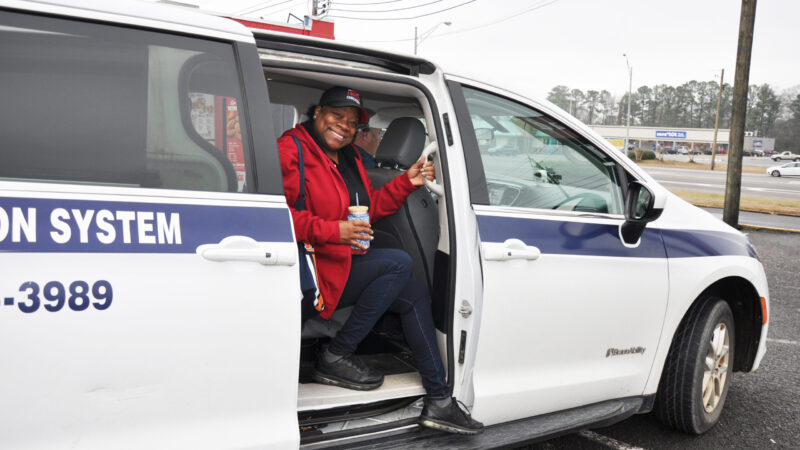Hurricane Banking Troubles
Days after Hurricane Katrina hit the gulf coast, many evacuees in Birmingham’s Red Cross shelter still could not access their bank accounts. Joe Lorge and America Williams are both from New Orleans.
(Lorge) “We were in a hotel and the bank that we used got blown away, so we can’t draw any money and we can’t call home for my wife to send money. So we’re stuck!”
(Williams) “It’s like I already tried my ATM card and when I try to put my pin number and stuff in it’s like, Infiniti, infisi … what you call that? (insufficient funds) yeahs, so the little money we do have it, it’s like, we down to our last, very, very, very last and it’s hard because we don’t know nobody out here.”
“Some of our systems were down. They were not able to use some of our bank online products, some of the ATM cards, Debit cards were not working.”
Herb Boydstun is president and CEO of Hibernia Bank. With 22 billion dollars in assets and 320 branches, Hibernia is Louisiana’s largest bank. Dozens of branches are still not open. Many are underwater in New Orleans.
“And that was a real serious problem. We apologize for the inconvenience that that caused.”
Along the Alabama and Florida coast, Compass Bank lost power at dozens of branches. But spokesman Mark Gibson says customers needn’t worry that their banking records are lost, even in the hardest hit areas where bank branches were destroyed.
“All banks and any major reputable company keeps backup records of customer information and customer transactions.”
Elias Awad is a banking expert at University of Virginia.
“Banks by law have to have a backup.”
Awad says that back-up can be on disc or tape or both and is stored in a location far away from the primary records. Safe from terrorist attack or natural disaster.
“One installation we did in Atlanta for a bank, the back-up, which is a tape, at the end of the day is in a nearby cave in a mountain. That’s where you have a humongous vault, air conditioned and everything, where every day the tape is shipped over there, just like shipping cash out of the fed.”
Bank officials say Y2K and 9-11 forced them to do a lot of scenario planning to prepare for a disaster. But Awad says many smaller, local and regional banks, can’t afford the same high-tech safeguards of larger banks like Hibernia. Even Hibernia chief Herb Boydstun concedes that his company’s disaster recovery plans weren’t extensive enough. They covered the data and operating systems, he says, but…
“You need to do very good disaster recovery planning as it related to communications. How do you communicate with your customers? How do you communicate with your employees when everybody has a 504 cell phone number that doesn’t work?”
Even today, customers calling Hibernia’s normal customer service line get a busy signal. The company has established special phone lines for customers and employees and Boydstun says it’s re-opening three to four bank branches a day. Some analysts speculate that a few smaller, local banks in the New Orleans area in particular, may never be able to re-open. If they go under, customers won’t lose their money completely, but they will have to wade through the bureaucracy of the Federal Deposit Insurance Corporation, which insures bank deposits.
Surgeon general nominee Means questioned about vaccines, birth control and financial conflicts
During a confirmation hearing, senators asked Dr. Casey Means about her current positions and her past statements on a range of public health issues.
Kalshi reveals insider trading case against editor for MrBeast
With prediction markets booming, so have concerns about insider trading. Now, Kalshi has disclosed its first public actions against accounts suspected of trading on confidential information.
Greetings from Jordan’s Wadi Rum desert, where patches of green emerge after winter rains
Wadi Rum's otherworldly landscape is where Star Wars movies and The Martian were filmed. In late winter, plants emerge in this desert — but some are toxic to camels, so their herders must protect them.
Lack of transportation keeps many Alabamians from working. Rural public transit programs are trying to help
While lack of transportation is a major employment barrier in Alabama, few people take public transit to work. That dynamic is even more pronounced in rural areas.
When a horse whinnies, there’s more than meets the ear
A new study finds that horse whinnies are made of both a high and a low frequency, generated by different parts of the vocal tract. The two-tone sound may help horses convey more complex information.
Hundreds of American nurses choose Canada over the U.S. under Trump
More than 1,000 American nurses have successfully applied for licensure in British Columbia since April, a massive increase over prior years.






